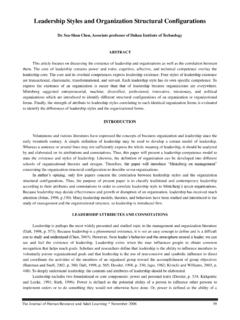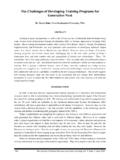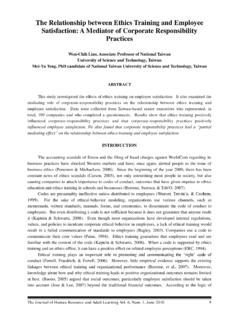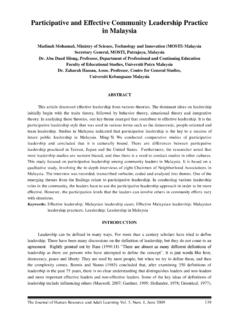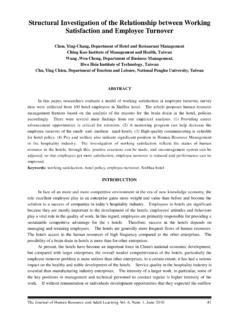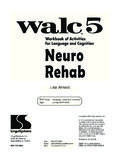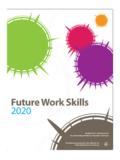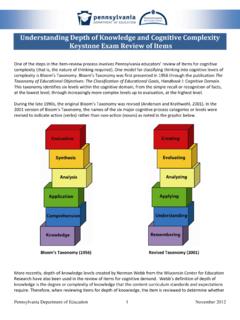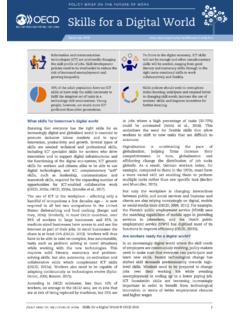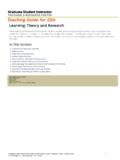Transcription of Analysis of English Cognitive Direct Method from …
1 The Journal of Human Resource and Adult Learning Vol. 7, Num. 2, December 2011 71 Analysis of English Cognitive Direct Method from the perspective of knowledge management Han-Kwang Chen, JinWen University of Science and Technology, Taiwan ABSTRACT The aim of this paper is to assess the efficient Cognitive English teaching methods for college students. The methodology is composed of the literature review and quantitative study explained as followed 1 .Literature review: literature review includes knowledge management , behavior English learning approach and Cognitive English learning approach- Direct Method . 2. Quantitative research: Assessing relationships among the 3 different learning periods ( pretest, posttest and 1-month posttest ) of the college students on their learning proficiency of vocabulary, listening, speaking and consolidated average.
2 A 4-month, after-class supplemental intensive English program on campus was undertaken and the researcher made a detailed Analysis of variables which contribute to the success of college students in learning English . Participants consisted of 85 college students joined an intensive English language program at an university in Taipei County. All students voluntarily enrolled in this supplemental project with a basic English level according to their English grades of college entrance examinations. The researcher was interested in determining whether the Cognitive Direct Method fitted with the concept of knowledge management would be beneficial for the subject students. Through a cross Analysis of the cause/effect between the Cognitive English teaching approaches and the students proficiency, this study also builds up the framework of efficient English learning models of college students from the perspective of knowledge management .
3 The result of this study shows the applicability of Direct Method to real social situations. The Direct Method is not accommodate with knowledge recitation, but this Method fitted with the Cognitive concept specializes in knowledge comprehension, creation and innovation, making it especially suited to tests and occasions which require problem-solving or free- form response. However, this study also suggests that to successfully teach English , teachers have to take into account new knowledge learning methods to make learning more efficient. Keywords: knowledge management , behavior English learning approach, Cognitive English learning approach- Direct Method INTRODUCTION As the advent of the era of knowledge economy, the trend of globalization that engulfed the world greatly contributed to people s motivations to acquire and manage knowledge .
4 During the previous 3 periods of the 4 developmental stages in human history, agricultural, industrial and information sciences, students were required merely to recite and duplicate knowledge without emphasizing their capabilities of knowledge innovation and creation (Coatsworth, J. H., 2004) . The different eras can be characterized by different social living styles and a number of significant changes The Journal of Human Resource and Adult Learning Vol. 7, Num. 2, December 2011 72 have occurred in the world. Looking upon the new perspective of knowledge management from the modern era of globalization. These days, knowledge becomes the primary source of human beings values; and the concept of education has evolved (Block D.)
5 & Cameron D., .2002) . Under the circumstances, higher educational institutions are now reviewing their English Teaching policies and English teachers are also adjusting their curriculum plans to meet the social demand. To help college students learn English efficiently, teachers should integrate different teaching pedagogies and search for the adequate Cognitive concept and materials to enlighten and teach students(Crystal. D., 2000). Behavior English Learning Approach English teachers learn efficient knowledge and from this viewpoint; they adjust their teaching methods and make ongoing learning an integral part of their teaching strategies. According to Crystal. D., the major bilingual theories, resulting from the field of educational psychology, are the behavioural and Cognitive approaches.
6 Behaviourists generally believe that students can be taught best when the focus is directly on the content to be taught. Lectures, tutorials, drills, demonstrations, and other forms of teacher controlled teaching tend to dominate behavioural classrooms. Warschauer Carr, W. & Kemmis S. 1985. Wu, H. Y. 2007 Behavioral bilingual researchers study the effects of stimuli on reflexive behaviours. It involves the acquisition of capabilities that are not innate and learning. Also, it emphasizes breaking down complex tasks into sub-skills that depend on training, stimulation and experience (Elliott, J., 1991). As breaking down complex tasks into sub-skills that are taught separately, learning usually depends on teaching authorization and simulative training.
7 Cognitive English Learning Approach- Direct Method Unlike behavioural bilingual researchers who study the effects of stimuli on reflexive behaviours, Cognitive theories suggest that learning is based upon mental processes. Learning would be extremely inefficient if students had to completely rely on classical and operant conditionings for learning. This theory contends that not all cases of learning can easily be captured by classical and operant conditioning modes. This perspective makes Cognitive Direct Method fit with the theory of knowledge management . The Cognitive Direct Method DM has a strong theoretical base in linguistics and psychology and this Method drills students to naturally use grammatical sentence patterns of English (Chern C, 2003).
8 With no recourse to the students native language, the meaning of target language will be conveyed directly through the use of demonstration and the implementation of visual teaching materials. Students therefore can overcome the habits of their native language and mentally form the new habits of English (Kruidenier J, 2002). The Cognitive English Direct Method vehemently opposes teaching with formal grammar and advocates that bilingual language learning is more than the learning of rules and the acquisition of imperfect translation skills (Huang, C., 2004). Its scholar, Heller. M., vehemently oppose teaching with the way of conditional learning. The Direct Method has some basic rules including the prohibition of using the native language in classes.
9 Because they can absorb a wide range of existing strengths of a variety of teaching methods , a compromise Method has its own unique advantages. In teaching, teachers can teach activities as a regulator, to avoid the shortcomings of the behavioral teaching methods . Under the perspective of Cognitive Method , Classroom instruction is conducted exclusively in the target language (Heller, M., 2005). The Journal of Human Resource and Adult Learning Vol. 7, Num. 2, December 2011 73 Oral communication skills are built up in a carefully traded progression organized around question-and-answer exchanges between teachers and students in small, intensive classes. Only everyday vocabulary and sentences are taught. Grammar is taught inductively either.
10 (Merton B, 2001).For teachers, new teaching points are taught through modeling and practice; concrete vocabulary. However, it is taught through demonstration, objects, and pictures; abstract vocabulary is taught by association of ideas. In addition, both speech and listening comprehension are taught and correct pronunciation and grammar are emphasized ( Lindsay A and Gawn J., 2005). In the classroom, the teachers need to get the students to practice both activities and interaction. Through the participation among students, the students concentrate more on interaction and on becoming more fluent with English (Palfreyman, D., 2006). STUDY Method The case institution launched a 4-month-long action plan named supplemental Intensive English Program - Cognitive learning Method An applicable strategy to optimize a Taiwanese college in Taipei county.
